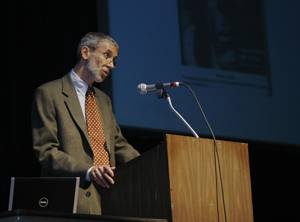More regulation needed to solve global climate problems

Ted Steinberg speaks on the political side of “Can Capitalism Save the Planet” on Thursday, Sept. 25, 2008, in the Ames City Auditorium at 520 6th St. A focus of the lecture was on the group, Keep America Beautiful, and their accomplishments improving the environment. Photo: Angela Hettinger/Iowa State Daily
September 24, 2008
Unfettered capitalism will not eventually solve our gloal environmental problems, said Ted Steinberg, Adeline Barry Davee distinguished professor of history and professor of law at Case Western Reserve University.cq
Steinberg spoke about the history of the recycling and green movements in the United States Thursday night at Ames City Auditorium, arguing capitalism cannot save the planet.
“[Capitalism] doesn’t even seem able to save itself,” he said. “No company is likely to betray its shareholders in the name of sustainability.”
Steinberg said the green movement, with its strong focus on personal responsibility, is letting corporations off the hook for the environmental damage that they create.
The recent economic downturn and the national debate on the logic of letting industry regulate itself has created a great opportunity for government to make laws to require manufacturers and corporations to engage in greener business practices, Steinberg said.
“We’re very very vulnerable right now, but the possibility of structural change comes from vulnerability,” Steinberg said.
He said the recycling movement did not arise from environmental groups, like the Sierra Club, but was started by corporations who were trying to avoid more regulations on their business practices.
Steinberg outlined the history of the curbside recycling, and said it grew with the support of bottling manufacturers and distributors who were opposed to a national bottle deposit bill proposed by Congress during the first Clinton administration.
With a national deposit bill, the distributors and bottlers would have to pay the cost of collecting the deposit containers, but curbside recycling leaves the responsibility with waste management services, he said.
The environmental movement to individuality parallels the deregulation of industry in the last 30 years, Steinberg argued, and the government should force industry to take responsibility for the complete life cycle of their products.
Approximately 75 people attended the lecture, sponsored by grant from Humanities Iowa and a number or other groups, including the GSB Committee on Lectures and the Ames Historical Society.






